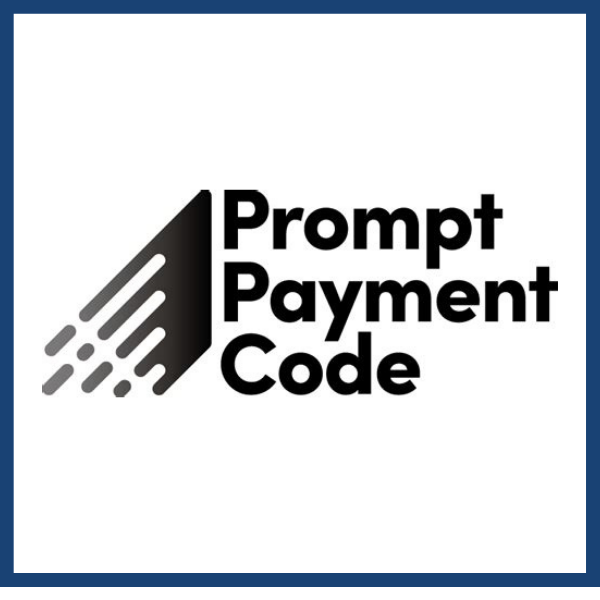Small businesses are at the heart of our communities, employing 61 per cent of the workforce. Yet, around 50,000 firms close each year due to cash flow problems. If larger businesses paid smaller suppliers sooner, more small firms have the opportunity to thrive, create new jobs and boost our economy. (source FSB)
It can take 90 days or more for a small business to get paid by larger corporates. During this time, they are using valuable cash resources to pay for people, materials, shipping and all the related costs of running a business. On top of this, they have to spend time calling customers and chasing payment: have they received our invoice, has it been approved, will it make the pay run?
The Prompt Payment Code UK
Ending late payments by paying small businesses sooner will free up cash. Cash to meet the costs of doing business. Cash that, today, often has to be borrowed at premium rates from banks and other sources. (Good Business Pays)

New rules came into play at the beginning of July to strengthen the prompt payment code that encourages companies to pay all businesses within 30 days (60 days for larger businesses). It currently has 3,248 signatories of which 529 are public sector, and 22 are outside the UK.
To sign up to the code signatories must
- confirm the requirement to pay 95% invoices within 60 days
- 95% invoices from small businesses (with less than 50 employees) must be paid within 30 days (effective from 1 July 2021 for existing signatories)
- Small and medium-sized signatories to report annually on their payment performance
- Signatories to recognise the right of suppliers to charge late payment interest and charges if an invoice is paid late without justification
- Applications to join the Code must be signed by the Chief Executive, Finance Director or, in the case of smaller businesses, the company owner
- Suppliers should be provided with a contact point for payment queries
It’s free to signup and open to any business.
Of course, prompt payment is not always that easy, the pain points are often highlighted to us by the accounts payable teams. Those we talk to range from pdfs being sent to the wrong email address, illegible handwritten invoices, no PO number referenced, duplicate invoice numbers and more. And this is before we start talking about internal errors such as manual data capture errors, lost invoices within the business, invoices requiring approvals being held up, and the list goes on.
How can you ensure that you pay your invoices on time?
It’s a combination of practices coming together to, ideally, form a touchless invoice process.
Firstly, educating the business. Why not consider a workshop with each department that has a procurement need, showing them your process to pay, and how, if they follow the procurement process, ultimately they will get their goods faster, supplier relationships will be better, discounts could even be achieved for early payment. A No PO No Pay system is a good place to start.
Next, it’s time to teach the suppliers what you need to ensure their invoices go straight through for payment. A new supplier may have to go through an onboarding process that confirms their details such as company number, VAT number, address, bank details etc before they can be added to the payment run. When onboarding a supplier, take the time to explain to them your process (you could even ask them to join in you a workshop where you demo your process from invoice receipt to payment)
Lastly, it’s time to examine your processes within the team. How much time is spent on manual, repetitive tasks? Are the processes you follow formed from workarounds that are there because of legacy systems? Do your team spend forever chasing invoices for approval around the business?
Once you have spent some time looking at these areas, then it’s time to think about automation. An AP automation solution can be as simple as data capture and posting to a finance system – or as complex as full purchase to pay automation. The best way to find out what’s best for you, your team and the business, is to speak to an expert.
AP Automation With the Experts
We have a listening team at Documation, whose job it is to do just that … listen. The team have worked at Documation for over 15 years (and some over 20!), and have listened to a lot of customers and helped them automate their processes. In a recent interview with a new customer, they spoke to us about the team…..
“The team have been amazing – Alan and Nick really have answered so many questions and have the balance perfect between showing us we should have confidence in what they are doing and because they are talking about their expertise, however not being obnoxious, and listening to what we have to say and coming up with suggestions. It’s so refreshing to see that Documation REALLY listens to us.”
So if you would like how to find out how to pay your invoices quickly and efficiently, enabling you to sign up to the prompt payment code and ensure the survival of UK’s SMEs then get in touch!





